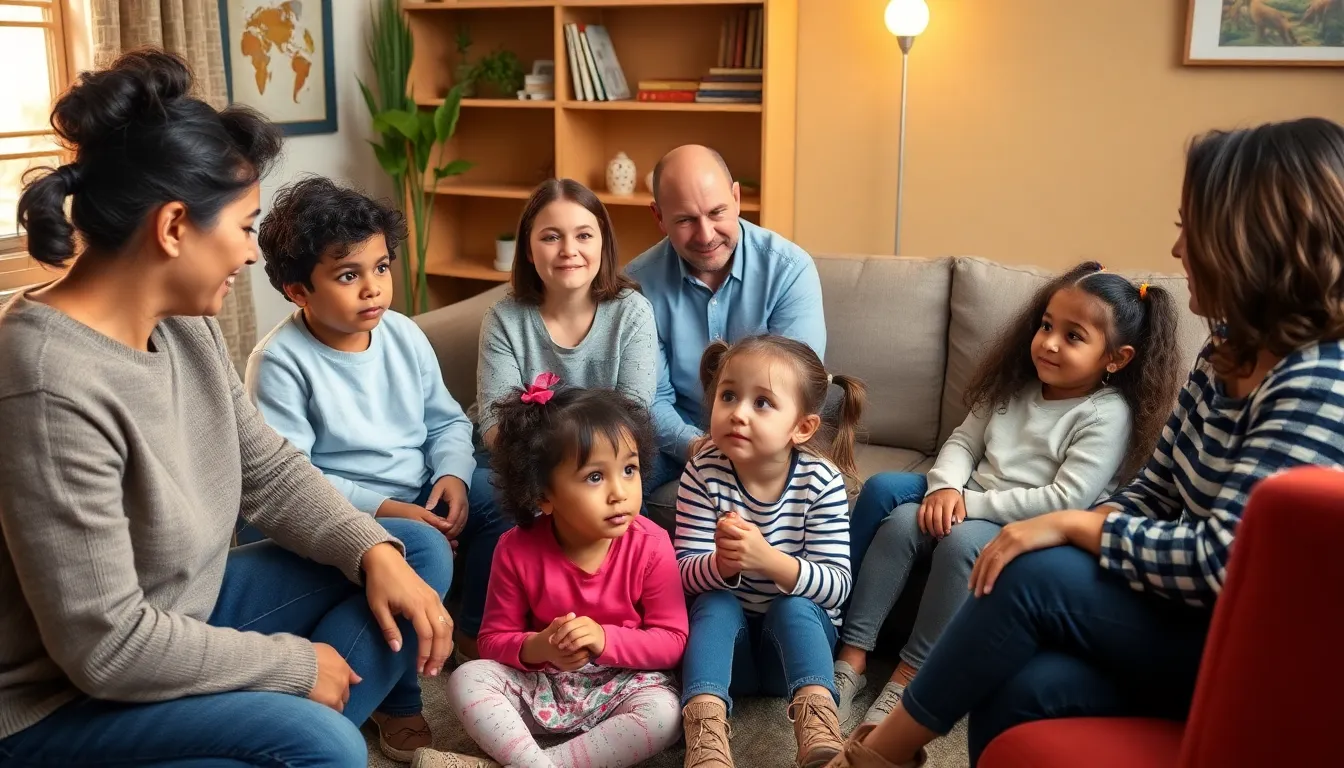Table of Contents
ToggleNavigating the world of mental health treatment can feel like walking a tightrope, especially when kids are involved. Parents often wonder, at what age does a child get the power to say “no thanks” to therapy? It’s a question that blends curiosity with a sprinkle of parental anxiety. After all, no one wants to be the parent who forces their child into therapy while they’re busy plotting their escape route.
Understanding the legal and ethical boundaries surrounding a child’s ability to refuse treatment is crucial. This journey isn’t just about age; it’s about maturity, understanding, and a dash of common sense. So buckle up as we dive into the age-old debate of autonomy versus guidance in the realm of mental health for children.
Overview of Mental Health Treatment for Children
Mental health treatment for children entails various approaches aimed at addressing emotional and cognitive challenges. Types of treatments include therapy sessions, medication, or a combination of both. Parents often choose therapy when behavioral issues impede a child’s daily life, as early intervention can lead to better outcomes.
Age significantly influences both the effectiveness of treatment and a child’s willingness to participate. Younger children may not fully grasp the importance of therapy and the nature of mental health issues. Older children and adolescents typically possess more understanding, which can impact their commitment to treatment.
Consent laws vary by state, affecting when a child can refuse treatment. Some states allow minors aged 12 and older to seek mental health care without parental consent. Others maintain stricter guidelines. Parents play a critical role in guiding their children through these choices, balancing the child’s autonomy and their own concerns for well-being.
Understanding a child’s emotional maturity helps determine readiness for treatment. Signs of maturity include the ability to articulate feelings and comprehend the purpose of therapy. Children lacking these skills may benefit from parental encouragement and support in seeking help.
Legal considerations intertwine with parental rights and children’s autonomy. Parents typically hold the decision-making power until a specific age or maturity level is reached. Professionals advocate for open communication between parents and children. This dialogue fosters trust, possibly reducing resistance to treatment while ensuring the child’s best interests remain prioritized.
Legal Framework Surrounding Treatment Refusal

Understanding the legal framework is crucial in navigating a child’s right to refuse mental health treatment. Laws vary significantly across states, impacting consent and treatment decisions.
Age of Consent in Different States
Age requirements for consent differ across states. Generally, children as young as 12 can consent to outpatient mental health services in some states. Other jurisdictions allow minors over 14 to make decisions regarding their treatment. Some states even permit children younger than 18 to refuse services if they demonstrate sufficient maturity and understanding. It’s important to note that these laws exist to balance a child’s autonomy with the necessity of parental involvement. Research indicates that the age of consent and treatment refusal varies widely, leading to potential confusion regarding a child’s rights and responsibilities.
Role of Parents and Guardians
Parents and guardians play a pivotal role in a child’s mental health treatment. They often provide essential support and guidance as children navigate therapeutic options. In many cases, parents retain the right to consent to treatment for their children until reaching adulthood. However, their influence doesn’t diminish a child’s ability to express feelings about treatment. Open dialogue between parents and children fosters a healthy environment where concerns can be discussed. Parents should recognize their child’s growing autonomy, promoting a balance between guidance and respect for their opinions. Effective communication between all parties can significantly enhance the therapeutic experience for children.
Developmental Considerations
Understanding developmental considerations in mental health treatment for children is crucial. Emotional maturity and cognitive development play significant roles in a child’s ability to engage with treatment and make informed decisions.
Emotional Maturity
Emotional maturity influences a child’s capacity to understand and articulate feelings. Children with higher emotional maturity often recognize the importance of mental health treatment. They express their thoughts and concerns more effectively. In contrast, younger children or those with lower emotional maturity might resist treatment due to fears or misunderstandings about its purpose. Parents should assess their child’s emotional development, as this understanding aids in fostering a supportive environment. Effective communication can enhance a child’s willingness to participate meaningfully in therapy.
Cognitive Development
Cognitive development impacts how children process information and make decisions. As children grow, their ability to comprehend the complexities of mental health treatments improves. Older children and teenagers often possess the reasoning skills necessary to weigh the benefits and drawbacks of treatment options. By age 12, many children begin to grasp the implications of treatment more clearly. Parents must recognize this developmental journey to facilitate discussions around mental health. Engaging them in conversations can lead to more informed choices about their treatment. Understanding cognitive capacities ensures that children feel respected and involved in their mental health decisions.
Impact of Refusal on Child’s Wellbeing
Refusing mental health treatment can significantly impact a child’s overall wellbeing. Parents and caregivers must understand the potential outcomes to make informed decisions regarding their child’s care.
Short-Term Consequences
Short-term effects of treatment refusal often manifest as heightened emotional distress. Children might experience increased anxiety or depression without therapeutic support. Some may exhibit behavioral issues, becoming more withdrawn or acting out. These reactions can disrupt daily life, affecting school performance and social interactions. Immediate communication with mental health professionals aids in addressing these challenges. Engaging children in conversations about their feelings can foster understanding and reduce resistance. Parents play a crucial role in guiding their children, emphasizing the need for treatment as a path to improved emotional health.
Long-Term Consequences
Long-term consequences of refusing mental health treatment can be profound and lasting. Untreated mental health issues may lead to chronic conditions, impacting adulthood. Increased likelihood of substance abuse often correlates with untreated mental health disorders. Educational challenges frequently arise, resulting in diminished opportunities for future success. Without proper intervention, relationships may suffer, creating isolation. Building resilience becomes increasingly difficult when children lack necessary coping skills. Emphasizing the importance of early intervention can enhance long-term outcomes. Ongoing support from parents and mental health professionals is essential in navigating these challenges.
Ethical Considerations
Navigating the ethical landscape surrounding a child’s refusal of mental health treatment requires careful consideration. Parental rights and a child’s autonomy often coexist in tension. Many parents strive to make decisions that they believe are in their child’s best interest, but children’s emerging independence complicates this process.
Maturity levels vary among children, impacting their ability to comprehend the implications of treatment refusal. A child exhibiting significant emotional intelligence typically understands their needs better. Professionals emphasize that respecting a child’s wishes can foster a sense of agency and trust, critical for effective therapy outcomes.
Laws pertaining to consent and refusal differ between states, affecting ethical obligations. Some jurisdictions recognize a child’s right to refuse treatment once they reach a certain age or demonstrate sufficient maturity. This legal framework aligns with a broader ethical principle focusing on individual rights and informed consent.
Discussions around treatment should include children whenever appropriate. Engaging them in conversations about their mental health fosters a collaborative environment. Parents can model this engagement by actively listening to their child’s concerns and validating their feelings.
Working alongside mental health professionals provides additional ethical support. These experts can guide families through the complexities of decision-making. Integrating insights from therapists can balance a child’s needs with parental responsibilities, ultimately creating a more comprehensive approach to care.
Evaluating the possible consequences of treatment refusal also plays a crucial role in ethical discussions. Immediate emotional distress can arise from a lack of treatment, underscoring the need for ongoing dialogue. Long-term effects, including the risk of chronic conditions, emphasize the urgency for parents and caregivers to navigate these choices thoughtfully.
Navigating the complexities of a child’s mental health treatment requires sensitivity and understanding. Parents must balance their child’s growing autonomy with the need for support and guidance. Recognizing the unique legal and developmental factors at play is crucial in fostering open communication.
By engaging in discussions about mental health, parents can empower their children to make informed decisions while ensuring their well-being. Ultimately, a collaborative approach that respects a child’s voice can lead to better treatment outcomes and a healthier relationship with mental health care.





